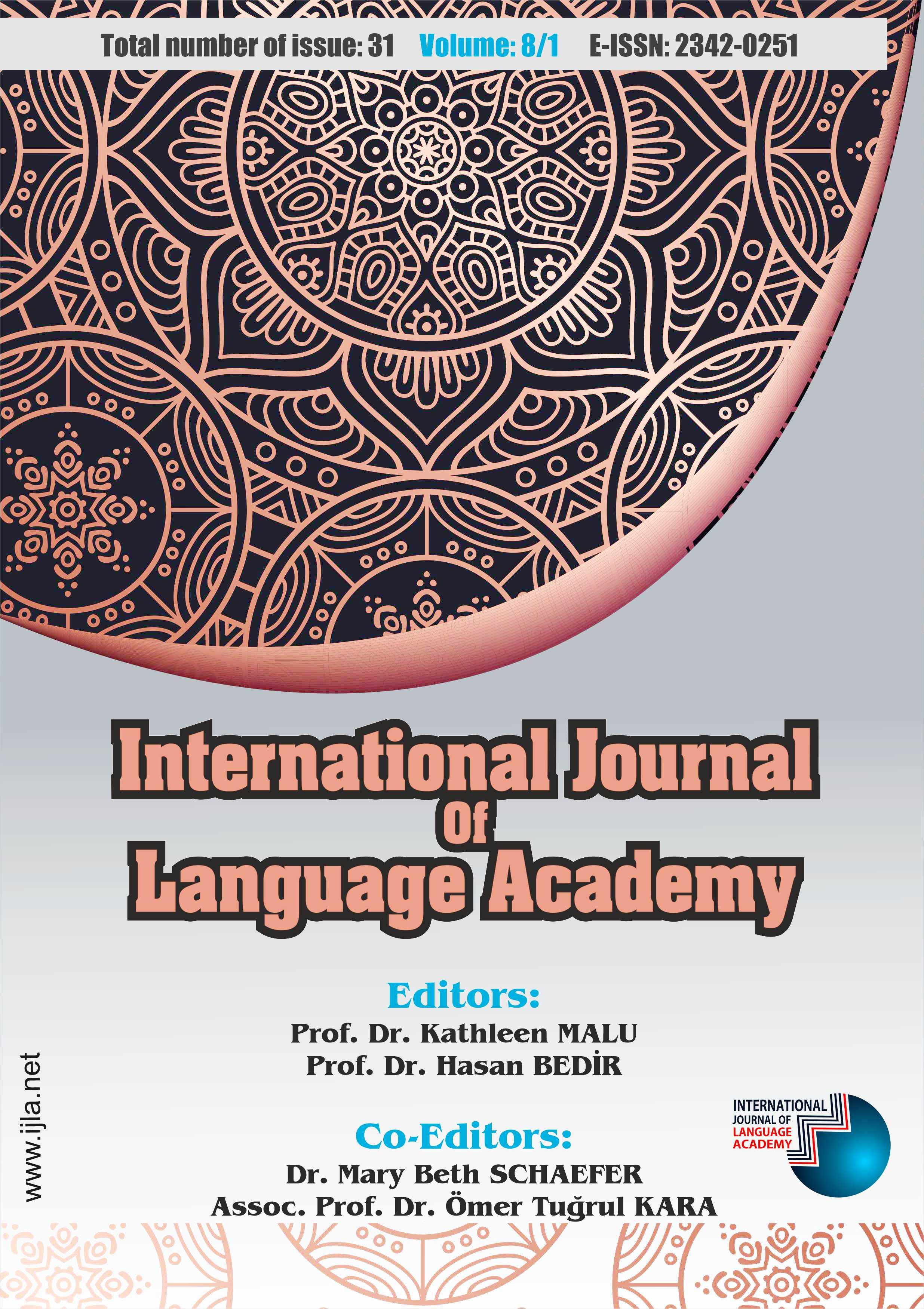Yabancı Dil Olarak İngilizce Öğrenen Türk Öğrencilerin Akademik Metinlerindeki Eylemler ve Örüntüleri
Author :
Abstract
Çalışmada Akademik Anahtar Kelime Listesi (AKL) (Paqout, 2010) içerisinde tanımlanan sözcüksel fiillerinin Türk öğrencileri tarafından edinimi ve kullanımı analiz edilecektir. Akademik Kelime Listesi, akademik metinlerin temel akademik taslağını ana hatlarıyla belirten ve belirli bir akademik alana özgü olmayan kelimeleri kapsar. Dört temel sözlük kategorisinde (isimler, eylemler, zarflar ve sıfatlar) tanımlanan bu kelimelerin öğrencilerin akademik kelimelerin sözcük dağarcığını ve aynı zamanda kullanıcılarına özgü bu kelimeleri ait sözcük-dilbilgisel özelliklerini hakkında bulgular vereceği varsayılmaktadır. Sözcüksel eylemlerin ayrıntılı analizi, araştırmacıların yabancı dil olarak İngilizce öğrenenlerinin Türk öğrencilerin aradil özelliklerini tanımlamalarına yardımcı olabilir. Bu çalışmanın kapsamı, bu kelime listesi içerisinde tanımlanmış eylemlerin derlem tabanlı bir analizi ile listede tanımlanmış sözcüksel eylemlerim iki farklı derlemde, TICLE ve LOCNESS, kullanım sıklığına dayalı liste hazırlanmasını ve yapısal özelliklerinin incelenmesidir. Ayrıca Örüntü Dilbilgisi (Pattern Grammar) yaklaşımı çerçevesinde en yüksek frekansa sahip 10 fiilin ayrıntılı bir analizi yapılmıştır. Sonuçlar, anadili olmayan öğrenciler tarafından bazı belirli kelimelerin fazla kullanımına işaret ederken, bazı eylemleri anadili İngilizce olanlara kıyasla az kullanılmıştır. Bu araştırma, öğrencilerin bu belirli sözcüksel ögeler hakkında örtük bilgi düzeylerini, akademik eylemleri
Keywords
Abstract
The purpose of this paper is to investigate the interlanguage features of Turkish EFL learners in academic written discourse. Acquisition and usage of lexical verbs of Academic Keyword List (AKL) (Paqout, 2010) by Turkish EFL learners will be analyzed. AKL covers the non-domain specific words which entitle the characteristics of academic texts and outline the basic academic sketch of the texts. It is assumed that the level of acquisition of these words that are defined under four basic lexical categories (nouns, verbs, adverbs, and adjectives) will reveal the students’ lexical repertoires of academic vocabularies as well as interpreting lexico-grammatical attributes specific to writers. Detailed analysis of lexical verbs may help researchers to define the interlanguage features of Turkish EFL learners. The scope of this study includes conducting a corpus-based analysis of verbs of AKL.For this corpus-based study, at the first level, comparison of TICLE (Turkish sub-corpus of International Corpus of Learner English) and the LOCNESS (The Louvain Corpus of Native English Essays) corpus was utilized to define general lexical profile of the learners by preparing frequency-based list according to usage levels of the verbs in two corpora. At the second level, a detailed analysis of 10 verbs with the highest frequency was conducted within the frame of the Pattern Grammar approach. Results indicate the overuse of some specific words by non-native students while some others are underused in comparison to native speakers of English. This investigation revealed the levels of students’ implicit knowledge of these particular lexical items, their awareness of register of academic verbs and to what extent they can put in use these items within the frame of functional lexico-grammatical usage.
Keywords
- Cortes, V. (2002). Lexical bundles in freshman composition. In R. Reppen, S. M. Fitzmaurice and D. Biber (ed.), Using Corpora to Explore Linguistic Variation (pp. 131–145). Amsterdam, NE: John Benjamins.
- Coxhead, A. & Nation, P. (2001). The specialised vocabulary of English for academic
- Hinkel, E. (2002). Second language writers' text: Linguistic and rhetorical features. Londra, UK: Routledge.
- Hinkel, E. (2004). Tense, aspect and the passive voice in L1 and L2 academic texts. Language Teaching Research, 8(1), 5-29.
- Kilgarriff, A., Rychly, P., Smrz, P. & Tugwell, D. (2004). Itri-04-08 the sketch engine.
- Krapels, A. R. (1990). An overview of second language writing process research. In B. Kroll (Eds.), Second language writing: Research insights for the classroom (pp.37-56), Cambridge, UK: Cambridge University Press.
- Leech, G. (2011). Principles and applications of Corpus Linguistics. In V. Viana, S. Zyngiera and G. Barnbrook (Eds.), Perspectives on Corpus Linguistics (pp. 155–170). Amsterdam, NE: John Benjamins.
- Llach, M. P. A. (2011). Lexical errors and accuracy in foreign language writing. Bristol, UK: Multilingual Matters.
- Nation, P. and Waring, R. (1997) Vocabulary Size, Text Coverage and Word Lists. In N. Schmitt adn M. McCarthy (Eds.), Vocabulary: Description, Acquisition, and Pedagogy (pp. 6-19). Cambridge, UK: Cambridge University Press.
- Paquot, M. (2010). Academic vocabulary in learner writing: From extraction to
- Troike, M. S. (2006). Introducing second language acquisition. Cambdrige, UK: Cambridge University Press.
- Woodall, B. R. (2002). Language-switching: Using the first language while writing in a second language. Journal of Second Language Writing, 11(1), 7-28.





